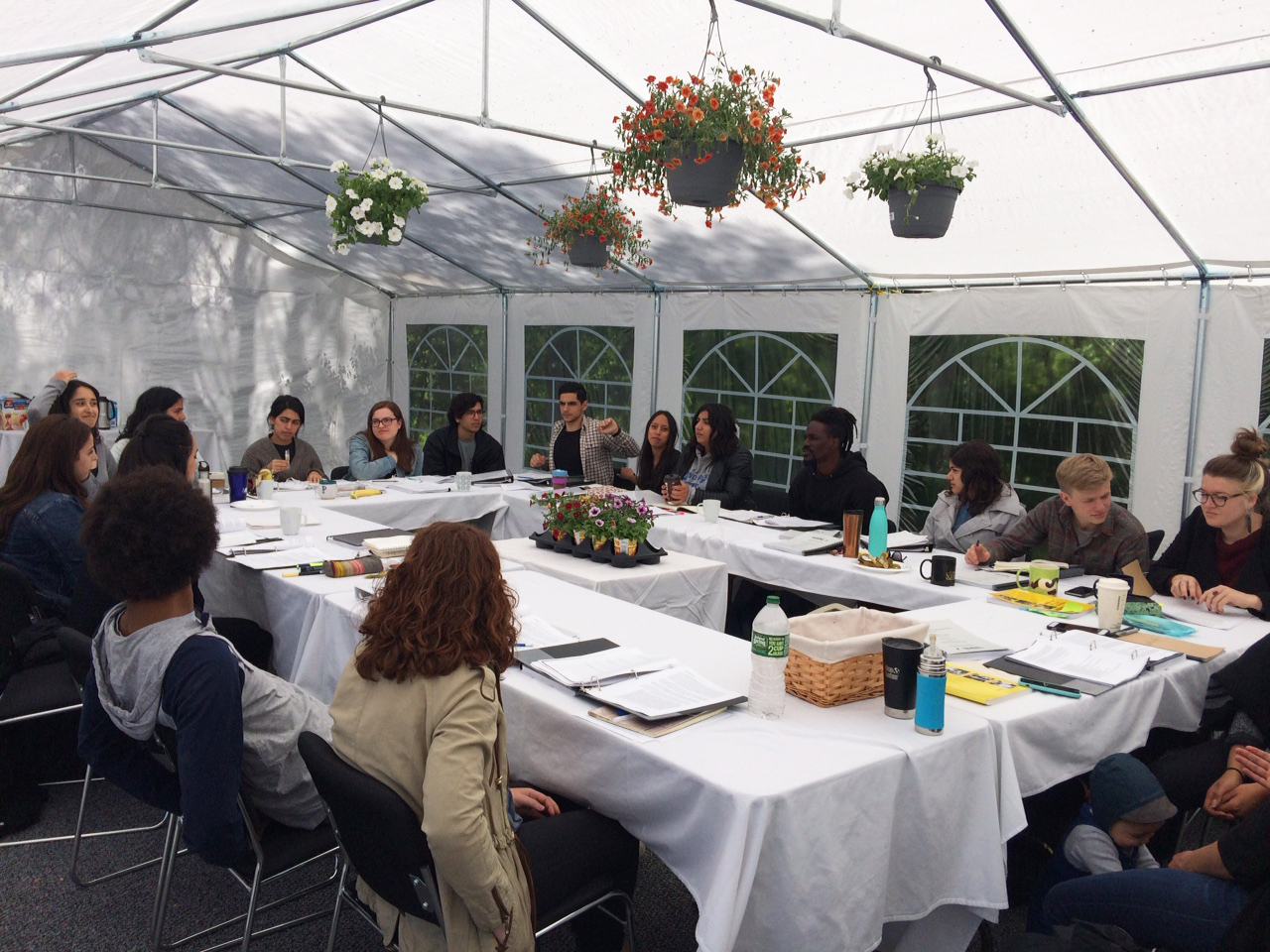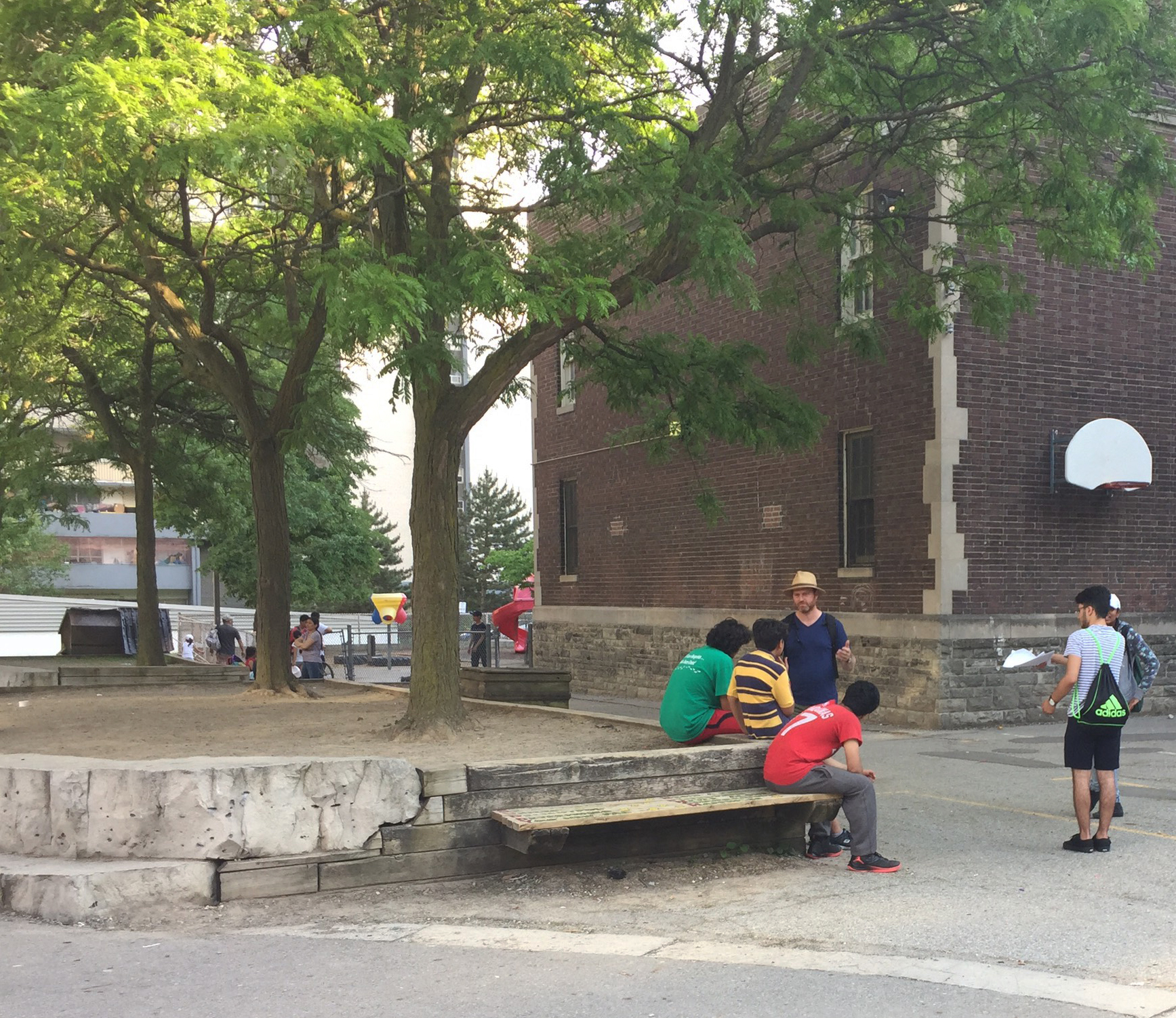Toronto learning site seminars: lessons from the grassroots
A few youth discuss the purpose of the seminars, what they learned about having meaningful conversations about the empowerment of young people, and how they plan to bring their experience back to their home clusters.
A total of 35 youth from 13 clusters—many of who are serving as junior youth or institute coordinators—gathered in a large white tent pitched on the grounds of the Bahá’í National Centre to participate in two Toronto learning site seminars, which took place from 20 May to 4 June and 10 June to 25 June, respectively. The learning site organized the seminars in collaboration with the Institute Board of Ontario. Participants came from a variety of places, including the clusters of Toronto, Montreal, New York, Boston, Ottawa, Waterloo, Hamilton, Brampton, London, York South, Halifax, Prince Edward Island and Niagara.

Participants begin their first day of the May 20th-June 4th seminar in a tent outside the Bahá’í National Centre.
In its Ridván 2010 message, The Universal House of Justice designated 32 clusters worldwide as learning sites for the junior youth spiritual empowerment program, to “provide training to coordinators from scores upon scores of clusters…enabling them to create a spiritually charged environment in which the junior youth programme can take root.” Toronto was one of these 32 clusters, and later, in 2014, more learning sites were added, including Vancouver.
Overseen by the Office of Social and Economic Development, these sites are able to transfer lessons generated at the grassroots globally. However, as one participant from Toronto explained, beyond simply articulating to the associated clusters what Toronto is learning and “having them consume it,” individuals from the associated clusters serve “in the field together,” at seminars, “learning side by side.” After they return home, a resource person affiliated with the learning site supports the coordinators, facilitating their collaboration throughout the year.
Engaging in an intensive seminar had a profound impact on the orientation of individual attendees. As one participant explained, “Usually when I’m tutoring or animating a group, I only think of the short term, like I’m helping the community or the junior youth. But in reality, this pool of knowledge that we’re creating…It’s a global project. And I think knowing that long term vision will make my desire to serve much stronger.”
Each day of the seminar began with collective prayer and meditation, followed by study. Then, in the afternoons and evenings, participants spent their time in several neighbourhoods across Toronto, engaging community members in conversations about the spiritual empowerment of young people.
Usually the seminars, which occur approximately two to three times per year, have a particular area of focus, which helps to systematize learning. The first seminar focused on meeting youth and inviting them to intensive institute campaigns to study Ruhi Book 1: Reflections on the Life of the Spirit and Ruhi Book 5: Releasing the Powers of Junior Youth. Twenty-six youth began their study of Book 1 within the context of these campaigns.
The focus of the second seminar, in the words of a participant, was to “Have conversations about the junior youth program in a way that elicits ownership from the community”—to see the empowerment of the young as a shared question to be explored as a community—and not as something that is primarily the concern of a small group of collaborators. She added that this involved building a profound understanding of the purpose of the program in community members, sparking a desire in their hearts to be of service. One method that proved effective was reading lessons from the junior youth texts with parents, as this allowed for more in-depth conversations. This led to the organization of gatherings for parents in several neighbourhoods, where they were able to discuss the program further. At the end of the two weeks, 95 new junior youth joined the program.
Counsellors Ms. Shabnam Tashakour and Dr. Borna Noureddin were present for a time at the seminar, and helped the participants to reflect on their inner conditions when conversing with friends in a neighbourhood setting. Several Auxiliary Board members also accompanied the neighbourhood teams during some of the afternoons.
Although the hours were long, the youths’ enthusiasm and the joy in their hearts increased as each day passed. They strived to maintain, as one participant called it, “cohesiveness” in their inner conditions throughout the day. She explained that the teams were in the field for long hours—at times from 2 p.m. to 10 p.m.—and feelings of discouragement could crop up if they felt a lack of response from community members. At these times, she learned to rely on the power of prayer to raise her spirit and keep her steadfast, increasing her consciousness of the power of divine assistance.

Institute campaign and learning site seminar participants serving in the Rowntree neighbourhood take a group photo in front of the Bahá’í National Centre.
The study in the morning aided in building conviction and courage for the field. The participants studied sections from Ruhi Book 5 and Ruhi Book 6: Teaching the Cause, which helped them to speak about the aims of the program—such as the enhancement of spiritual perception—and raised awareness of the requisite qualities and attitudes of teaching. They also studied the first unit of Book 10: Accompanying One Another on the Path of Service, particularly relevant as many of the participants are learning to accompany animators.
One participant recalled that before the seminar he was afraid to teach because of the possibility of rejection, but now, he has learned to be detached from results and to act with firmness and purpose. He shared his understanding that, “When you talk to someone…you’re not looking at just a person; you’re looking at them as the next coordinator, or someone who has a lot of potential to develop their capacity for service.”
Likewise, the seminar helped the participants see new possibilities in their own clusters. Some of their plans included strengthening the junior youth program and assisting upcoming institute campaigns. As one participant expressed, his hope was to use his experience at the learning site to “serve at a higher capacity and as a better resource” at home.
– Sara Zahraei








